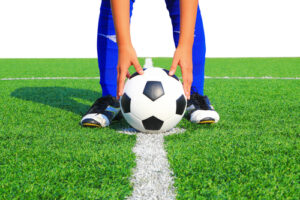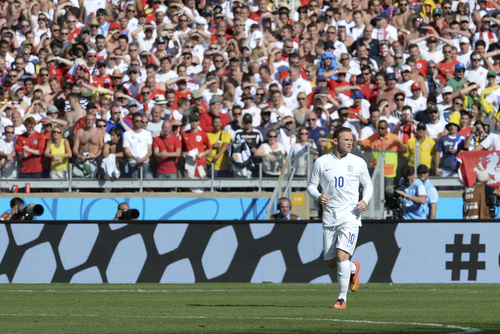Fans of English football will recognise that this summer marks the 50th anniversary of England beating Germany in 1966 to win the World Cup. Fifty years on, England, with their array of footballing stars, will be seeking a Euro win after winning all of their qualifying matches. This series of activities will help your class get into the excitement of Euro 2016 whilst learning new skills and knowledge.
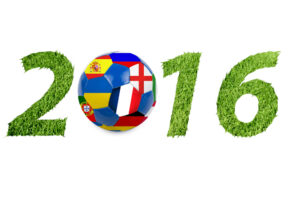
Activity One – Match Commentary
Suitable for Years 3 to 6
Learning Objectives:
- To be able to write for different audiences
- To be able to use the appropriate tone and style of voice for different situations
- To be able to condense sentences whilst not losing their meaning
We often ask pupils to comment on what they see in pictures or read in books but it’s not often that we ask them to describe what is happening in ‘live action’. In this activity, the pupils will write and record a commentary for part of a football match.
Use a recorded clip of a football match at Euro 2016 – it needn’t be long – anything from one to five minutes. Before you play the clip to the pupils, watch it yourself and note who the teams and the players are who appear on the clip. Now let the pupils watch the whole clip to start with. After they are familiar with the action, break the clip down into smaller pieces; individual passes, shots, saves etc. and, after telling the pupils who the players and teams involved are, ask them to tell you a sentence that describes what is happening. Continue with the remaining parts of the clip until the whole clip has been written about.
Now replay the clip with you reading the sentences they’ve composed. How easy is it to say the sentences in the time the action takes place on the video? Sometimes it will fit, but in the majority of cases you’ll find that the sentence is too long.
With the sentences on the board, ask the pupils to shorten them to fit by concentrating on the key information. e.g.
“Vardy passes the ball to Rooney on his left” might become…
“It’s Vardy to Rooney” or even “Vardy to Rooney” or when the game really speeds up… “Vardy, Rooney”
Once the class are happy that the words fit, play the clip again with the program Sound Recorder operating to record the pupils’ commentary. With any free movie making software such as Microsoft Movie Maker, you should be able to link both together and make great sports videos.
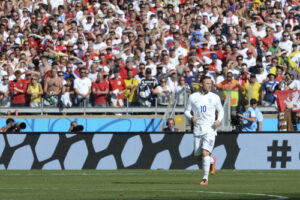
Activity Two – Jouer au Football
Suitable for Years 3 to 6
Learning Objective:
To be able to translate words from English into French
To be able to speak French words and phrases with the correct accent
With the Euros in France this summer, it is a great excuse to learn a little footballing French. From ‘jouer au football’ to ‘marquer un but’, the class can fill their boots with some soccer language from across the channel.
Begin by asking the pupils to draw a football match on an A3 or A2 piece of paper. Add in all the things they think would be seen at a match. From this, get them to research the French for each aspect and label the picture accordingly.
To really test their knowledge, encourage the use of post it notes to cover up the French words and ask their friends to recall and say the French.
Activity Three – Organising a Tournament
Suitable for Years 2 to 6
Learning Objective:
To be able to research information on a topic and present it for different audiences
To be able to use the correct operations for mathematical problems
Euro 2016 has taken many years of preparation, as do all major sports events – just ask your teachers how long it takes to organise Sports Day! It’s not just getting the teams organised and the stadiums but lots of things have to happen in the background to make it a successful and profitable event.
Begin by doing a knowledge harvest of all that they think might be involved in organising a major sporting event. You should get ideas such as organising the televising, the catering, transport to the matches, security, advertising, football merchandise etc.
Once you have got your list, ask pairs or groups of pupils to find out how much this costs and what the quantities involved are. From this, get them to draw an infographic to add to a ‘Football Crazy’ wall display on the numbers involved in the ‘beautiful game’. You can add in facts like the total value of the players in each team, how many of their last games they’ve won, lost or drawn or how many times they’ve made it to the finals.
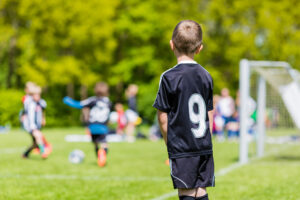
Activity Four – Speaking and Listening – Guess the Team or Player?
Suitable for Years 3 to 6
Learning Objective:
To be able to decide which information is relevant when searching the internet
To be able to present information in different ways
This activity involves a little research, some judicious presentation of information and speaking and listening skills in an assembly.
Using the teams plus a selection of well-known players, ask the pupils to find out facts about them. They can decide on the facts or you can give them the accompanying template to work to (see image below).
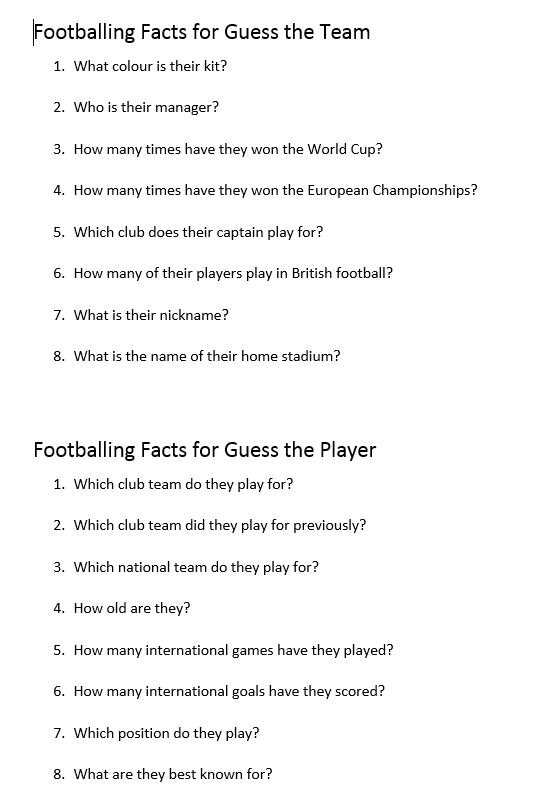
After finding out the information, plan a Euro 2016 assembly and use the information to ask the assembled pupils to guess the team or player from the information given. You can make it even more exciting by giving fewer points the more clues that are needed.
For example:
- They play in all blue with red socks at home, blue and white away
- Their manager is called Didier Deschamps
- They have won the World Cup once
- They have won the Euros twice
- Their captain plays for Tottenham Hotspur
- Eleven of their Euro 2016 squad play in English football
- Their nickname is Les Bleus
- Their home stadium is the Stade de France
Speaking skills will need to be clear and loud with possibly an accent, whilst their listening skills will need to be sharp to hear the answers.
